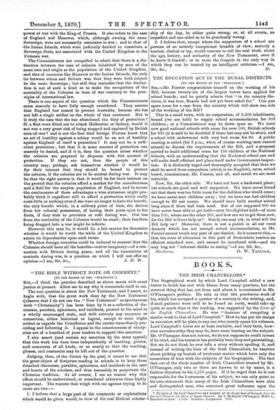"THE BIBLE WITHOUT NOTE OR COMMENT."
[TO THE EDITOR OF THE ..SPEOTAT0311 "SIR,—I think the practice described as above meets with scant justice at present. Allow me to say why it commends itself to me.
The real question is about the New Testament, and I assert, to begin with, that the great work done by the New Testament • with " Christianity") has been done by it as a collection of dis- courses, parables, aphorisms, and incidents, present to the mind in a wholly unarranged state, and with scarcely any sequence or .connection, either historical or logical, except to some slight • extent as regards the Crucifixion and the events immediately pre- -ceding and following it. I appeal to the consciousness of ninety- nine out of a hundred of your readers to support this assertion. I also assert (and sustain my assertion by the same appeal) that this work has been done independently of teaching, glosses, and comments of all kinds, or so nearly so that the teaching, glosses, and comments may be left out of the question. Judging, then, of the future by the past, it seems to me that the great object of Scripture reading in schools is to keep these detached discourses, parables, aphorisms, and incidents in the ears and hearts of the scholars, and thus insensibly to perpetuate the Christian tradition. At all events, I see no reason why this effect should be undervalued, or considered otherwise than highly important. The reasons that weigh with me against trying to do more are two :— 1. I believe that a large part of the comments or explanations which would be given would, in view of the real Biblical scholar- ship of the day, be either quite wrong, or, at all events, so imperfect and one-sided as to be practically wrong. 2. I believe that, except where the supporters of a school are persons of an entirely exceptional breadth of view, scarcely a teacher, clerical or lay, would venture to tell the real truth about the age, history, and authority of the New Testament, even if he knew it himself ; or to treat the Gospels in the only way in which they can be treated by an intelligent criticism.—I am,


































 Previous page
Previous page